|
|
|
Sort Order |
|
|
|
Items / Page
|
|
|
|
|
|
|
| Srl | Item |
| 1 |
ID:
153611
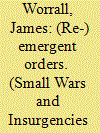

|
|
|
|
|
| Summary/Abstract |
The concept of order is often neglected in the study of conflict – seemingly such a ‘disordering’ process. With the recent increase in the examination of rebel governance however, bringing order back into our understanding of rebel and insurgent groups has much to offer in exploring the everyday politics which connect authorities, rebel movements and the population itself, in a complex mass of intersubjective and power-based interactions and negotiations. Rebels both shape and are shaped by existing forms of order in complex and ongoing ways. This article explores how varying elements interact in the negotiation, framing and enforcement of order and develops an original analytical framework to examine the perpetual negotiations of rebel movements in their attempts to cement their control.
|
|
|
|
|
|
|
|
|
|
|
|
|
|
|
|
| 2 |
ID:
146456
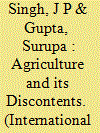

|
|
|
|
|
| Summary/Abstract |
The demise of the Doha round of trade negotiations is often attributed to deadlocks in agricultural negotiations between the developed and the developing world. Why has agriculture been so difficult to negotiate? This article explains North-South agricultural negotiations through the lens of coalition politics, especially the shift from bloc to issue-based diplomacy from the developing world. We argue against the proposition in the negotiation literature that multiple coalitions at the international level allow negotiators room to maneuver. Our study shows that bloc coalitions in fact allowed for compromise more than issue-based coalitions in agriculture, which are often supported by strong domestic constituencies. Empirically, the article focuses on the Uruguay Round when the North and South struck an agreement on agriculture and the Doha Round, which remains deadlocked. The article also provides an in-depth case study of India’s agricultural interests and its food security program in the context of the WTO.
|
|
|
|
|
|
|
|
|
|
|
|
|
|
|
|
| 3 |
ID:
084418


|
|
|
|
|
| Publication |
2008.
|
| Summary/Abstract |
To what extent did secrecy emerge as the uncontested norm for international negotiations after the Renaissance? This article introduces six key negotiation practitioners from 17th century Europe, including some of the earliest writers on negotiation: Hotman, Mazarini, Wicquefort, Rousseau de Chamoy, Callières, and Pecquet. An analysis of their writings demonstrates that if an ambassador had to appear in the bright light of the royal court, he became constantly preoccupied by secrecy. He needed to find ways to protect his own secrets from third parties and uncover the secrets of others. These concerns from earlier times helped to establish secrecy as the paradigm for modern negotiation
|
|
|
|
|
|
|
|
|
|
|
|
|
|
|
|
| 4 |
ID:
178571
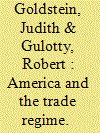

|
|
|
|
|
| Summary/Abstract |
The era of American leadership in the multilateral trading regime has ended. This paper argues that this current antipathy to trade is unsurprising: support for US leadership of the regime has always rested on a precarious balance among domestic interests. To overcome a historic bias in favor of home market production, American leaders created incentives for exporters to organize while creating roadblocks for import-competing firms and their employees. The dominance of the exporters’ voice had a significant influence on the policies the US pursued in the design and execution of the global trade regime. Most importantly, the absence of labor's voice undermined the prospect for “embedded liberalism” and instead resulted in an anemic system of adjustment for job loss at home and limited support for worker interests within the regime. While policymakers’ decision to shift power away from potential “veto” groups may have been necessary for US leadership of the Liberal International Order, this institutional design undermined a robust response to the economic dislocation thought to be a result of globalization. The result was a fracturing of the coalition in support of American leadership in the GATT/WTO regime.
|
|
|
|
|
|
|
|
|
|
|
|
|
|
|
|
| 5 |
ID:
126726
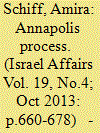

|
|
|
|
|
| Publication |
2013.
|
| Summary/Abstract |
The analysis indicates three sets of factors through which parties' willingness to achieve a consensual solution can be assessed: the contextual factors that contribute to adversaries' decision to proceed to official negotiations, the functions of the pre-negotiations and the changes that occur in the parties' perceptions during the pre-negotiations. A simultaneous exploration of these factors provides a more complete assessment of the parties' intentions and their willingness to proceed to negotiations directed at a win-win solution. This, in turn, enables a better understanding of the factors that undermine de-escalation initiatives, not only between Israel and the Palestinians but in other intractable conflicts as well.
|
|
|
|
|
|
|
|
|
|
|
|
|
|
|
|
| 6 |
ID:
068930


|
|
|
| 7 |
ID:
108328
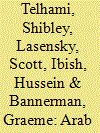

|
|
|
| 8 |
ID:
120718


|
|
|
|
|
| Publication |
2013.
|
| Summary/Abstract |
Abstract Not only is the participation of developing countries in international trade negotiations growing, so is their influence over the global trade agenda. This article highlights the increasing activism and impact of African states through a detailed study of the current Economic Partnership Agreement (EPAs) negotiations with the European Union (EU). In examining African resistance to EPAs, the article develops a constructivist approach to North-South trade negotiations that pays close attention to the role of development discourses. We argue that the growing willingness of African states to challenge the EU to deliver on its development promises during the decade-long EPA process was crucial to informing their sustained opposition to the EU's goal of completing a comprehensive set of sub-regional economic agreements. We document African resistance to EU trade diplomacy in the EPAs, exploring how these otherwise weak countries were able to pursue normative-based negotiation strategies by recourse to the EU's promise of a 'development partnership.'
|
|
|
|
|
|
|
|
|
|
|
|
|
|
|
|
| 9 |
ID:
089512


|
|
|
|
|
| Publication |
2009.
|
| Summary/Abstract |
Mediating regional conflict in Asia is a delicate art. It requires an acute understanding of the unique mediation culture in the region. China's mediation in the nuclear crisis on the Korean Peninsula reveals key elements of this art and offers useful lessons. China's experience illustrates that an influential but neutral and harmony-oriented mediator is critical in the Asian context. It is equally essential for the mediator to (1) abide by the principle of noninterference in other countries' internal affairs while maintaining active intervention as dispute escalates, (2) stand ready to nudge those being mediated toward action when necessary to advance peaceful negotiations, (3) establish an optimal environment to foster communication and reduce hostility between the major parties in dispute, (4) serve as an honest broker but remain firm in its own position and cautiously take initiatives to guide the talks, (5) advocate a step-by-step approach to the negotiation process, and (6) aim for the outcome of negotiations to be a give-and-take agreement. Although Asia is a conflict-prone region, Asians traditionally confuse mediation with meddling. As a result, non-Asians often try to serve as mediators for Asia. For more effective mediations, it is essential that Asians rediscover their useful mediation skills and that non-Asians better understand the Asian art of mediation when they act as mediator.
|
|
|
|
|
|
|
|
|
|
|
|
|
|
|
|
| 10 |
ID:
078839


|
|
|
|
|
| Publication |
2007.
|
| Summary/Abstract |
Bargaining at various levels has taken on a greater role in our understanding of international relations. work presented a model in which bargaining at the international level would result in the status quo advantaged actor getting his ideal agreement. We conducted a face-to-face experiment between sixty-eight pairings of men to test this prediction in a controlled setting. All of the participants were presented with the same bargaining problem in different contexts. For each pairing, we collected data on a trial bargaining period under a "classic" Nash bargaining problem (under private information, but without monetary incentive) and two bargaining periods with an underlying unidimensional issue space (i.e., Milner's model, once under private information, the other under full information, each with monetary incentive). While the Nash bargaining solution was consistently chosen under the "classic" Nash bargaining problem, it was rarely chosen when the bargaining problem represented an underlying unidimensional issue space. For the unidimensional bargaining problem, private information did not facilitate producing any consistent outcome; under full information, the "equity point"-in which each participant earned the same dollar amount-was chosen significantly more often than any other outcome, even under a context in which the equity point was incentive incompatible for one actor to agree to that agreement. The overall results suggest that the Nash bargaining solution is predictive when it is also a focal point in the bargaining space, but is only prescriptive in a bargaining space with many mutually improving points. Finally, private information allowed the status quo advantaged actor to get a better deal compared to the full-information condition.
|
|
|
|
|
|
|
|
|
|
|
|
|
|
|
|
| 11 |
ID:
064493
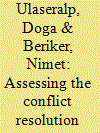

|
|
|
| 12 |
ID:
088933


|
|
|
|
|
| Publication |
2009.
|
| Summary/Abstract |
This article addresses the conflict over the Euphrates and Tigris waters from the perspective of negotiation theories, by examining the role of power in upstream/downstream negotiations. Conceptual and empirical links are established between water, negotiation (structure, process), power (asymmetries, coalition dynamics, strategies, development of alternatives) and security (direct/indirect interests such as national security, border security, territorial claims, economic development and environmental concerns). The study concludes that asymmetries in power have favored upstream/downstream interactions towards bilateral if not basin-wide arrangements. The framework shows that traditional elements of power, such as upstream positions, military and economic resources, do not constitute the only sources of power. Bargaining power can also determine the dynamics between respective riparians. Time constitutes an important source of power, and interests vary over time when political settings and security concerns shift. Downstream or more vulnerable riparians can invert situations of power asymmetry by acting on the basin-dominant riparian's interests and thus reduce its alternatives. Syria's use of 'issue-linkage' in its interactions with Turkey over water and wider security issues serves as the primary example.
|
|
|
|
|
|
|
|
|
|
|
|
|
|
|
|
| 13 |
ID:
082367
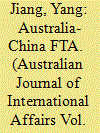

|
|
|
|
|
| Publication |
2008.
|
| Summary/Abstract |
This article seeks to explain why the Free Trade Agreement negotiation between Australia and China has been extremely difficult, despite political goodwill from Beijing and Canberra. It first argues that the reason for the slow progress of the negotiation is not caused by lack of motivation from the Chinese government. It then lists the differences in negotiation between China and Australia, focusing on their respective selective vs. comprehensive, border vs. behind-the-border, flexible vs. rigid and state vs. market approaches. It then looks into domestic politics in China to explain why China has taken such a stance, underlining domestic resistance from sectors like agriculture and services in a dynamic domestic political environment on the one hand, and the structure of the policymaking institution that constrains the power of trade negotiators on the other. It concludes by pointing out where the potential for a breakthrough in the FTA negotiation lies.
|
|
|
|
|
|
|
|
|
|
|
|
|
|
|
|
| 14 |
ID:
131988
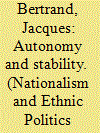

|
|
|
|
|
| Publication |
2014.
|
| Summary/Abstract |
Autonomy is often seen as an institutional instrument to manage substate nationalist conflict. Its implementation is key in determining its impact on conflict. While the central state might be satisfied with the absence of violence and stability as a measure of success, an aggrieved group will view success as gaining new powers and new resources. Autonomy often unravels when different goals are being pursued during implementation. "Special autonomy" in Papua failed because, first, the law was not the product of negotiation but of a solution that the central government imposed; second, Papuans remained divided on its utility and, ultimately, failed to seize the opportunity provided; third, the central government undermined the law in its attempts to curb secessionism, ultimately failing to make it credible.
|
|
|
|
|
|
|
|
|
|
|
|
|
|
|
|
| 15 |
ID:
082448


|
|
|
|
|
| Publication |
2008.
|
| Summary/Abstract |
Secret back-channel communication is often employed in severe conflict to explore the feasibility of front-channel negotiation. It can also be used as an adjunct to front-channel negotiation when talks become deadlocked or as a substitute for front-channel negotiation. Its value lies partly in the flexibility and future orientation it brings to talks. In the prenegotiation phase, it also provides political cover, is cost-effective, does not require formal recognition of the adversary, and allows communication with adversaries who do not meet preconditions for negotiation such as a cease-fire. Intermediaries and intermediary chains are sometimes used in back-channel communication. Heavy reliance on back-channel communication can produce flimsy agreements that are too narrowly based or fail to deal with major issues. But this problem can be avoided if enough time is spent assembling a broad central coalition
|
|
|
|
|
|
|
|
|
|
|
|
|
|
|
|
| 16 |
ID:
197202


|
|
|
|
|
| Summary/Abstract |
Why do governments make concessions to some rebels but not others? We argue that the origins of rebel groups influence the bargaining process, and the government’s willingness to make concessions in particular. Rebel groups inherit different resource endowments – community ties and military expertise – from pre-existing “parent” organizations. These resource endowments are visible to the government, and they provide critical information about the likely durability of the rebellion. We expect that rebel group origins facilitating these endowments are associated with the state offering concessions earlier in the conflict. Employing original data on rebel group origins, as well as information on government concessions during post-Cold War African conflicts, we find general support for our expectations, although not all types of parent organizations are equally beneficial to rebel groups when it comes to extracting concessions from the state.
|
|
|
|
|
|
|
|
|
|
|
|
|
|
|
|
| 17 |
ID:
075805


|
|
|
|
|
| Publication |
2006.
|
| Summary/Abstract |
examine the determinants of conflict and settlement by embedding probabilistic contests in a bargaining framework. Different costly enforcement efforts (e.g. arming, litigation expenditures) induce different disagreement points and Pareto frontiers. After examining the incentives for settlement, I demonstrate how different division rules and bargaining norms have real, economic effects. I then analyze some sources of conflict. I emphasize long?term, strategic considerations by examining an illustrative model and discussing particular historical examples.
|
|
|
|
|
|
|
|
|
|
|
|
|
|
|
|
| 18 |
ID:
157849


|
|
|
|
|
| Summary/Abstract |
Despite the long standing “no concessions” argument, scientific studies now suggest that governments can benefit from negotiating with militant insurgencies. However, despite government efforts, the leaders of insurgent movements often appear fanatical and unwilling to negotiate. This behavior presents a puzzle: If the leaders of insurgencies mobilize to create political change, and a government offers concessions, why do insurgent leaders refuse to negotiate? Using a game-theoretic model, we argue that insurgent leaders may rationally reject negotiation due to an internal commitment problem. Specifically, when leaders cannot credibly share the benefits of peace with their rivals, insurgent leaders may reject offers over fear of an internal conflict, which could leave the entire group vulnerable to government exploitation. However, the model demonstrates that insurgent leaders should negotiate if power in the insurgency is shifting in favor of their rivals, as it could help them maintain control of the movement. We illustrate these hypotheses using evidence from the Nigerian state's conflict with the Movement for the Emancipation of the Niger Delta (MEND) organization and Boko Haram.
|
|
|
|
|
|
|
|
|
|
|
|
|
|
|
|
| 19 |
ID:
172329


|
|
|
|
|
| Summary/Abstract |
How does diffusion of civil war battles influence conflict termination? Recent advances in civil war literature have found that battle dynamics shape conflict termination by affecting the intra-conflict bargaining between disputants. This article extends the theoretical perspective and argues that how battles diffuse matters in determining conflict termination. While battlefield dynamics should in principle reveal previously unavailable private information, the relevance of information-revealing effect depends on the diffusion patterns of battles. The persistent, and possibly battle-exacerbated, commitment problem can also alter the prospects of conflict termination. We test the argument by distinguishing two distinct diffusion patterns of battles: distant and proximate. The empirical results reveal that distant diffusion, but not proximate diffusion, of battles makes civil conflicts less likely to terminate. The analysis also demonstrates that incorporating diffusion dynamics significantly improves our ability to predict conflict termination.
|
|
|
|
|
|
|
|
|
|
|
|
|
|
|
|
| 20 |
ID:
079658
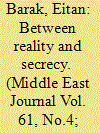

|
|
|
|
|
|
|
|